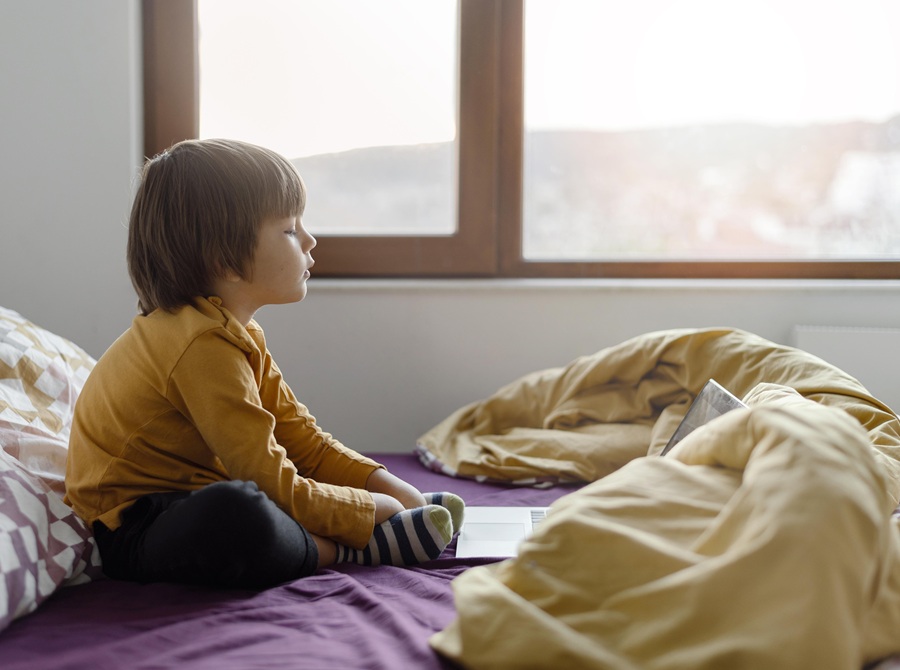Why Sleep Matters for Children with Autism: A Complete Guide
 Sleep is one of the most important elements of a child’s growth, brain development, and emotional well-being. However, children with autism spectrum disorder (ASD) often have a hard time sleeping, making restful nights difficult for both them and their families. These sleep concerns can contribute to behavioral symptoms and influence quality of life.
Sleep is one of the most important elements of a child’s growth, brain development, and emotional well-being. However, children with autism spectrum disorder (ASD) often have a hard time sleeping, making restful nights difficult for both them and their families. These sleep concerns can contribute to behavioral symptoms and influence quality of life.
In this article, we’ll help unpack the unique sleep challenges faced by children with autism. We’ll also discuss how poor sleep can impact their development and strategies to improve sleep quality for everyone involved.
The Link Between Autism and Sleep Disturbances
Children with autism commonly have trouble falling asleep, staying asleep, and maintaining a regular sleep cycle. Several factors can contribute to these issues, including sensory sensitivities, anxiety, and differences in melatonin production.
Many children with autism have heightened responses to environmental stimuli, making them more sensitive to light, sound, and touch, which can disrupt sleep. Additionally, anxiety and difficulties with self-regulation can make it harder for them to relax before bedtime.
Research shows that up to 80% of children with autism struggle with sleep disturbances, compared to about 25% of neurotypical children. Studies also suggest that children with autism may produce the essential sleep hormone, melatonin, at irregular levels. That could make it even harder for people on the autism spectrum to establish a healthy sleep pattern.
Why Does Sleep Matter?
Lack of quality sleep can have serious effects on a child’s cognitive, emotional, and physical well-being. For instance, poor sleep is linked to difficulties with memory, learning, and attention, which can all make it harder for children with autism to process new information and manage daily routines.
Emotionally, sleep deprivation can increase anxiety, irritability, and behavioral challenges, which may contribute to more frequent meltdowns or outbursts. Physically, inadequate sleep can weaken the immune system, slow growth, and contribute to weight gain or metabolic issues.
How To Improve Sleep for Children with Autism
Helping children with autism achieve better sleep requires an intentional approach that addresses their unique needs. Let’s discuss four strategies that can improve sleep quality and create a more restful bedtime routine.
Establish a Consistent Sleep Routine
Children with autism often thrive on routine, and a structured bedtime schedule can help regulate their internal clock. To start building a routine, set consistent sleep and wake-up times, even on weekends.
Using visual schedules, timers, or social stories can also help children understand what to expect during bedtime. Calming pre-sleep activities, such as reading a book, listening to soft music, or engaging in deep-pressure stimulation (DPS), can also help them feel relaxed and signal that it is time for sleep.
Creating a Sensory-Friendly Sleep Environment
Sensory sensitivities can make falling and staying asleep difficult for children with autism. To help with this, soften the sleep environment by controlling light, noise, and temperature. Blackout curtains or dim lighting may help those sensitive to bright light, while white noise machines or fans can block out disruptive sounds.
Additionally, weighted blankets, soft bedding, and breathable pajamas can provide comforting sensory input and help children feel relaxed. It also helps to make sure the bedroom is clutter-free and designed for sleep rather than playtime.
Note that weighted blankets are not suitable for everyone, including infants, toddlers, and those with mobility issues. Talk to your practitioner about whether weighted blankets might support your child and, if so, what weight would be appropriate.
Behavioral and Therapeutic Approaches
Some children may benefit from behavioral sleep hygiene training. This is a practice that involves reinforcing positive sleep habits and gradually adjusting bedtime behaviors. Parents may also consider using visual cues or social reinforcement to encourage independent sleep.
Occupational therapists may also recommend sensory integration techniques to reduce nighttime restlessness. Deep-pressure therapy (DPT), rocking motions, and certain relaxation exercises can help calm an overstimulated nervous system.
Medical and Dietary Considerations
In some cases, dietary changes or medical interventions might be the next step. Melatonin supplements have been shown to help regulate sleep cycles in children with autism, though they should be used under medical supervision.
You could also encourage better sleep for your child by cutting off caffeine, artificial additives, and suspected food allergens in the evening. If sleep problems persist, a sleep specialist may be able to help you understand the causes and recommend personalized treatment options.
When To Seek Professional Help
While many sleep challenges can be managed with home-based strategies, some children need a little professional help. Signs that your child might need this extra support include severe insomnia, frequent night awakenings, long-term difficulty falling asleep, and excessive daytime sleepiness.
Some sleep disturbances can contribute to behavioral regression, increased anxiety, or noticeable daytime complications, and should also be evaluated by a pediatrician or sleep specialist. Professionals such as behavioral therapists, occupational therapists, and neurologists can also help identify the underlying causes of poor sleep.
Final Thoughts
Quality sleep is key for children with autism. It influences everything from their cognitive abilities to emotional regulation and physical health. If you understand the common sleep challenges faced by children on the spectrum, you can start finding a solution that works best for your family.
Early intervention and professional support, when necessary, can significantly improve sleep patterns and everyday life. This makes sleep an important (and often overlooked) element of autism care. Supporting better sleep not only benefits the child but also improves family dynamics.
Brad Zelinger is the founder and CEO of Stride Autism Centers.
- May 19, 2025
